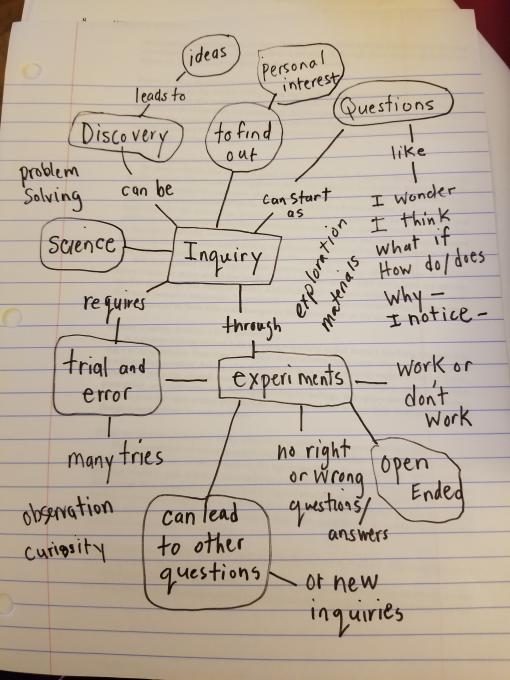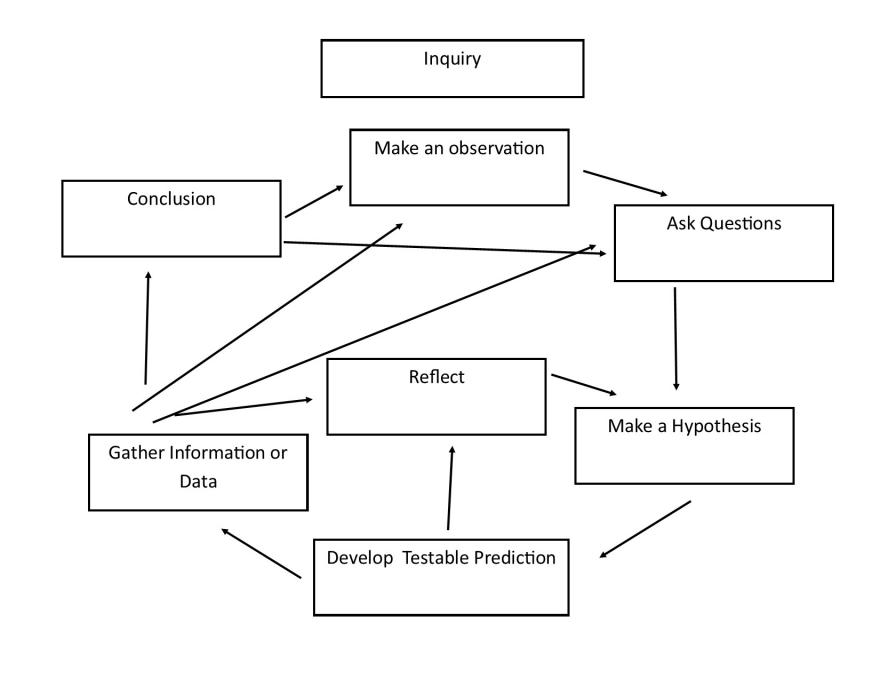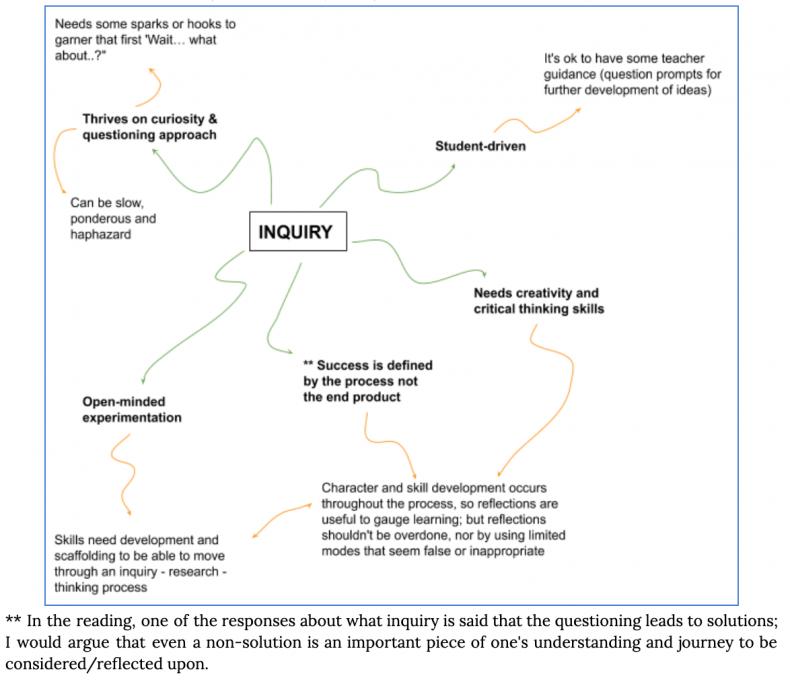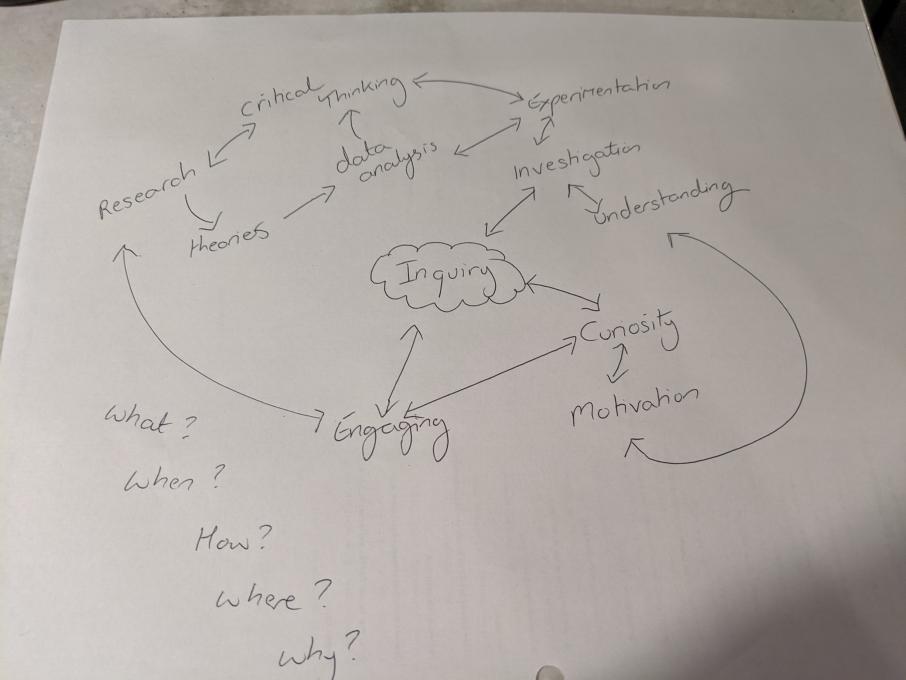The Cornell Lab Bird Academy › Discussion Groups › Inspiring Investigations through Citizen Science › Intro to Inquiry
-
Inquiry is finding answers to questions from many sources such as experts, experiments, field work, text, articles, and questioning. Inquiry should be contextual to the students and their surroundings. Inquiry should also appeal and be relevant to the community that is being served especially when it is combined with problem based learning.

-
The inquiry learning process is fundamentally the wonder of an individual or group of learners that have questions and is willing to seek answers through many pathways and some that may lead to additional or new questions to provide deeper understanding and learning.

-
I found the article very enlightening, especially the myths associated with inquiry. I am a high school teacher and think I want to use more inquiry in my everyday classroom activities but struggle to fit it in and cover the required material for end of course tests. I teacher upper level students who complete very thorough research projects so definitely inquiry there but I find it harder to work it in with my lower ability students. I guess I need to learn more on how to guide them and help them stay on task in a more open learning format.

-
That was a thought-provoking section about myths, wasn’t it? I especially appreciated debunking the myth “doing hands-on science is the same as doing inquiry” with the term “cookbook” activity. Why do we have to teach this way? Trying to use more inquiry will be a struggle for me too! I am a pre-K through 5th grade nutrition educator teaching at five different schools. I must use mandatory curriculum that is scripted which does not allow for much flexibility. I am hoping to find a way to be able to inject inquiry into what I can personalize in my teaching.
-
-
I think of inquiry as a fundamental curiosity/wondering/questioning that is driven by observations, most commonly sensory observations. These may be stand alone observations, or repeated observations that follow a pattern of days, weeks or months etc. Inquiry also includes the process of determining how to research or collect evidence, knowledge, or data to answer questions that are being asked. Within the specific process discussed in the articles there is a socio-cultural orientation and valuation to specific methods of inquiry, and kinds of knowledge. There are a lot of things I am thinking about with respect to "inquiry" and how I want to define it and approach it with my students. Mainly what occurs to me is that students need unstructured opportunities for observing, and discussion opportunities for deciding what they value, or find interesting to generate a sweet spot for their own questions, and the tools that they think will support them in documenting their own experience so that they remember it, but can also follow up and begin a path of investigation.

-
Inquiry typically starts with a phenomenon (often from the natural world around them) that students are curious about or want to investigate in order to gain a greater understanding of the phenomenon. Inquiry often begins with the generating of questions that students have about the phenomenon. Once this initial brainstorming session is complete, students choose a question(s) to further investigate; they come up with a plan to complete this investigation; they record their findings and use those findings to draw conclusions, which they might share with others. Inquiry is rarely a linear pathway in the way that completing a Science experiment in linear; instead it is more cyclical. As students complete their inquiry based investigation, they may find themselves returning to different parts of the cycle, for example, they may find that completing the investigation actually leads them to asking different questions, and so, they may need to create a new plan and further investigate to draw conclusions and expand their scientific understanding of the phenomenon.
-
Inquiry is driven by our natural curiosity and solution-driven brain. Our ancestors had to be curious, make observations, solve problems using trial and error, and then utilize these new discoveries in order to survive. Children easily tap into this natural curiousity, and eagerly embark on adventures and exploration to learn about the world. Education systems that nuture and encourage curiosity and observation, risk taking, and information processing should be more the norm than the exception. These skills empower students to be their own 'teacher' and promote learning beyond the classroom setting.

-
Inquiry is a natural process humans go through as they seek the answers to life's questions, both big and small. I think it is our job as educators to tap into this natural process and equip students with the skills necessary to more effectively engage in inquiry for the rest of their lives.

-
I appreciated that inquiry was described as a life long learning process, as well. I agree that it's a full-circle feedback loop that helps us navigate life's challenges, becoming able to recognize things that challenge our preconceptions or find things that we have had no occasion as yet to learn about, and pursuing answers.
-
-
At its best, inquiry is a life-long, multi-faceted, pursuit of knowledge and understanding. It may be a solitary or collaborative process that is creative and rooted in our natural curiosity about the world in which we live. It is a continuous cycle stemming from our observations, wonderings, and ability to problem-solve. In the classroom*, inquiry is an authentic means of learning and assessing as it is student driven and action-based. Since it is based on student interest, inquiry lends itself to differentiation and a means of learning accessible to all students. Through inquiry, students are empowered with the skills to ask and answer their own questions they have of the real-world. Inquiry is cross-curricular and a heavily integrated approach to education that focuses on the development of the whole person impacting the intellectual, emotional, social and even physical skills of students. *the classroom does not necessarily mean a room with four walls... it is the place where learning happens. In our Kindergarten, this is often outdoors or on field-trips, in the kitchen, and on the playground.

-
I love the spider web here and the idea behind it- that inquiry knowledge gained branches out into future experiences.
-
“Inquiry is cross-curricular” resonated with me, especially because your concept map combines science, art, and nature. Inquiry is also a lifelong skill once you learn how to use it.
-
@Pam I am planning a Science Lit focus class. We are going to read a book called "Who Really Killed Robin?" I love cross-curricular instruction. I will also be adding the inquiry piece to my class. This will be for a 7th grade bunch of students!
-
This is amazing! I love it and I want you to teach me to use color like this! :) thank you!
-
-

-
I had fun with this! I view inquiry as a way to foster independent thinking, and encourage kids to ask their own questions and engage with their environment to deepen their own understanding of the world.

-
The sweeping "in search of.." arc pointing towards "understanding" really highlights the philosophy of Inquiry. In search of understanding is a driving force of our desire to learn. I love the flow of your chart and the cross-overs, moving from general to specific and pulling it back again in on itself through your arc. Really a great capture, I think. Thanks for sharing. Laurie
-
-
When I think of inquiry I think of young children asking: why, why, why, why? I think this curiosity of how the world works is a natural trait of all youth. However, the reaction we receive from our many "why's" determines how many more questions we might ask in the moment and as we get older. If we're met with frustration, anger, and dismissal we may begin to lose our natural tendency toward inquiry and as we grow into middle and high school we still associate this curiosity with being annoying and uncool. But if we are instead met with encouragement, excitement and leadership, our desire for inquiry can last beyond our adolescence and well into adulthood.

-
Right on, Kristen. I share your enthusiasm and I wholly agree that our sense of wonder is our natural state that somehow gets suppressed as we grow. I too, believe that this is largely due to the responses we have to our inquiries during pivotal stages of our development, especially during our early years and adolescence. Our educational systems also are more interested in "right answers" than they are in process which has, in my opinion, a huge impact on our willingness to take risks and ask increasingly complex questions. Too much energy spent in memorization and surface knowledge is great for trivia but poor for discovery.
-
-
As I did the concept map I just let my mind wander and wrote down everything, so it's a little more personalized to how I consider inquiry. To me, inquiry is natural wonder and excitement over the magic in life. I experience inquiry everyday, like when I wake up in the morning and immediately look out the window to see what birds are visiting my bird feeder. Inquiry comes from experiences that make you go "huh" and make you want to keep learning new things. While this comes naturally to me in my adult life, I can see how inquiry, especially scientific inquiry, needs to be facilitated in youth. I'm very excited to get back in the classroom and help kids see the wonders in science and nature so they can gain a lifelong curiosity.

-
Interesting article and one that should be studied in every education program for teachers....As children grow, they need time to be in the moment and explore their surroundings. From the time they are babies, they can make a mess and naturally learn as they use their senses to explore their natural world and play with their toys. That leads to their first step of questioning and curiosity and confidence to investigate and wonder and experiment. When children ask questions, I like to respond with "what do YOU think?"

-
Inquiry is innate and differs from person to person. The teacher acts as a guide to reawaken a process which came naturally to the very young and needs to be encouraged as students grow and participate in school. Inquiry drives learning which helps to motivate a student to find out more about a subject. It needs to be authentic and include ways of processing the information so that more questions can be posed and further learning can continue. From the reading, I realized the importance of collaboration and how it can contribute to the excitement and drive that we hope our students can find.

-
INQUIRY is something that is part of living. People need to learn new skills to live. The article was remarkable in that inquiry can be used to engage students into active and meaningful learning. The learning though inquiry looks open ended with topics and outcomes evolving. It is amazing to see all of the concepts maps that have been posted. These maps are diverse and extremely interesting.

-
The diversity of concept maps is interesting to me too! They are giving me a lot to consider in both style and substance.
-
-
 The process of making an inquiry starts with a question about something you want to investigate. After making observations or gathering data, the results may cause you to rethink your question or may allow you to continue to make discoveries through critical observation or data gathering. This process can also be affected by what you already know, and applying the knowledge, making sure you take into account the new discoveries. Once all the data has been collected, and reviewed, an assumption can be created. The findings can be shared and reviewed by others.
I really like the emphasis how critical thinking and life-long learning skills are developed when going through an inquiry.
The process of making an inquiry starts with a question about something you want to investigate. After making observations or gathering data, the results may cause you to rethink your question or may allow you to continue to make discoveries through critical observation or data gathering. This process can also be affected by what you already know, and applying the knowledge, making sure you take into account the new discoveries. Once all the data has been collected, and reviewed, an assumption can be created. The findings can be shared and reviewed by others.
I really like the emphasis how critical thinking and life-long learning skills are developed when going through an inquiry. -
To me inquiry starts with some sort of observation or there is a question. Once you have that a person does some research to see if the question or observation can be explained. When we want to see how something works or if the research is true and experiment is conducted. Data is collected and a person draws conclusion. Conclusions can create more question and the process can repeat.

-
After reading about inquiry, I’ve expanded my thinking about all it encompasses. I found the readings to reinforce the value that I believe inquiry holds, and gave me better ideas of how to share with others the value of inquiry as well as a broader way of thinking about it. A broad, deep understanding about the world around us is one of the greatest contributions I think we can make to our communities.

-
My definition of Inquiry: Inquiry is a process used by active, lifelong learners to understand the world, using knowledge, skills, and creativity. It is individualized, and natural in children, but can be nurtured and sharpened. It starts out in curiosity with questions about some observation that doesn’t fit in one’s expectations. Through prior knowledge (our own and others’), we come up with a hypothesis, devise ways to test it, collect and interpret data. Incorporating discussions with others, we broaden our understanding and reflect to raise new questions, thus continuing another cycle of the process, deepening our interactions with the subject. The role of teachers is to be a facilitator that guides students through their own inquiry process. Inquiry Concept map:
 And this is the "Before (reading)" concept map, for comparison:
And this is the "Before (reading)" concept map, for comparison:

-
 Inquiry is the way humans learn about their natural world. It is something humans naturally do but unless it is nurtured, we forget how to participate in the process. When we answer children's questions and do things for them we are stifling their ability to figure things out. We must nurture their curiosities and encourage them to try to find the answers to their questions through investigations.
Inquiry is the way humans learn about their natural world. It is something humans naturally do but unless it is nurtured, we forget how to participate in the process. When we answer children's questions and do things for them we are stifling their ability to figure things out. We must nurture their curiosities and encourage them to try to find the answers to their questions through investigations. -
Inquiry-learning is a holistic approach to science and a complex cycle that involves many people and does not follow set steps. It allows learners to become scientists and "do" real science. The inquiry process is learner and curiosity driven, and creates lifelong learners and a love of learning!

-
This is a wonderful concept map! I like how you added the process in not linear and a complex cycle. I cannot agree with you more.
-
@Jessica Great map- you clearly captured my thoughts about inquiry.
-
This is a very thorough concept map, and clearly defines the relationships and actions involved with inquiry.
-
This a well thought out concept map! I think it defines the inquiry process without using the traditional definition format.
-
-
Although inquiry can be defined using a variety of terms that seem endless as you continue to brainstorm, I like to think about inquiry in simple terms as finding the answers to questions about things that interest you through discovery and trial and error.

-
INQUIRY- An investigation to finding an understanding, more knowledge or truth about a specific topic.

-

-
Smriti, you have some points which I really like. Open-minded experimentation and the need for sparks to begin the process of what about ...? or what if...? I also really like that you consider the whole person and the character and skill development which happens along the path of inquiry and the importance of reflection. I am curious what you mean when you say it shouldn't be overdone.
-
@Nini Hi Nini, Thanks so much for your feedback! I love sparks and can't help but think about my students' experience when they are in my class. I really work on the principal that "if I'm bored, then the students are bored", so I'm conscious of their socio-emotional state as well as their cognitive state whenever I'm working with them. As for the 'overdoing reflections' - I have seen many instances of reflections being demanded of students after every piece of work or every activity, and it gets tiresome and disingenuous. I think there is a time and place for reflections, and when done at the right times, can be very powerful. Some of the times I think that are appropriate may not be universal for all students, so I think we could differentiate reflections based on that too. For example, I've found reflection works well when a student:
- makes a discovery or has an 'aha!' moment
- arrives at/overcomes challenges in thought or process
- has an emotional reaction to their learning
-
I really appreciated your use of squiggly lines to represent that the process is not static. Also love that you point out the process, not the end result, is the point of inquiry based investigations.
-
@Sara Thanks, Sara! The squiggles also represent my brain's journey - it's definitely never in a straight line and I go all over the place!
-
-
Inquiry is to want to know. Without this there is no knowledge. To inquire is to observe, ask, question, investigate, form an opinion, research and understand. The cycle is often repeated and expanded upon. Critical questions involve why, what if, how, when and what. Inquiry can have multiple start points and is only confined to the individuals thirst for knowledge and understanding about the subject matter.


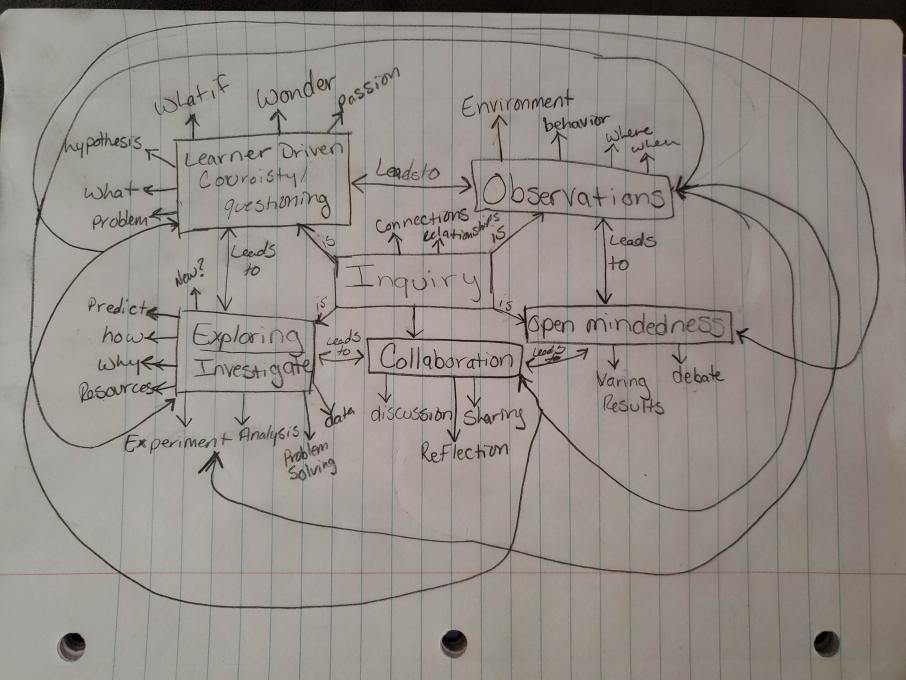
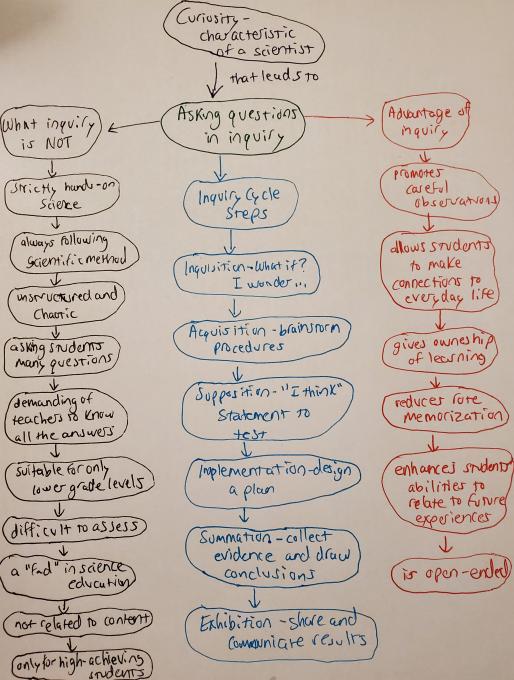
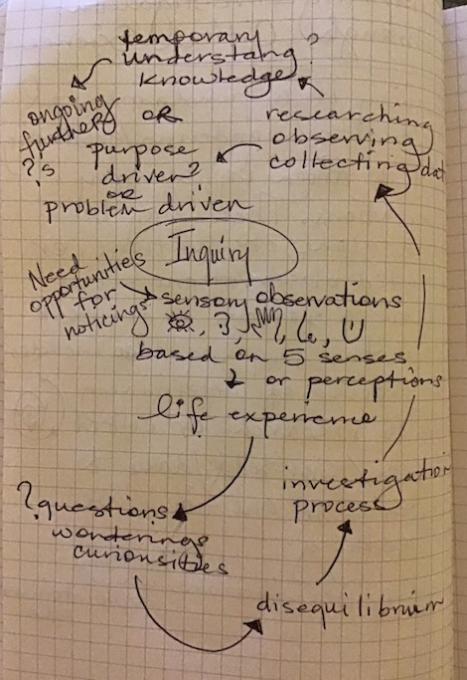
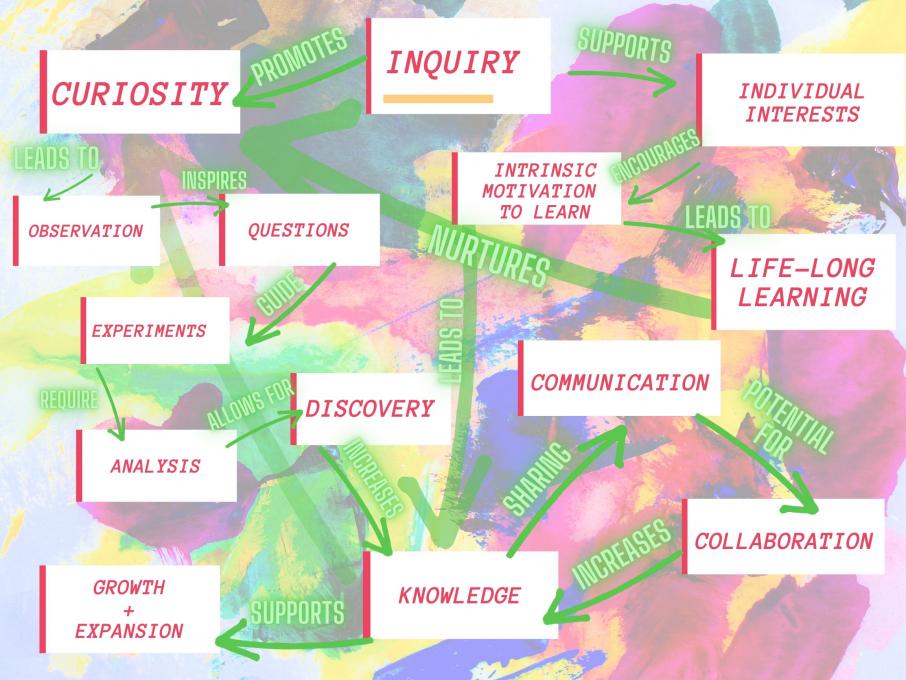
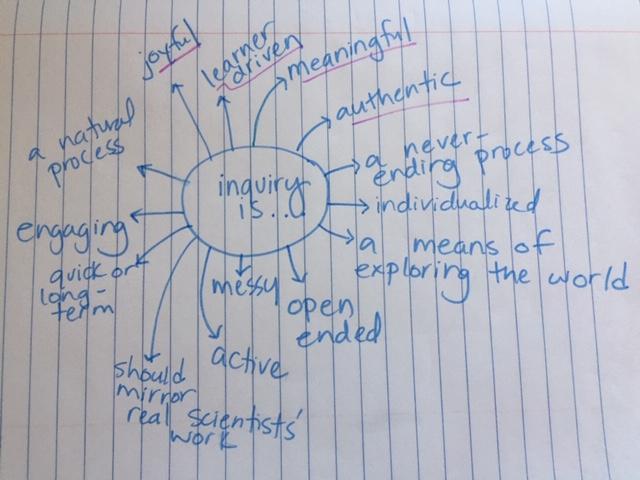
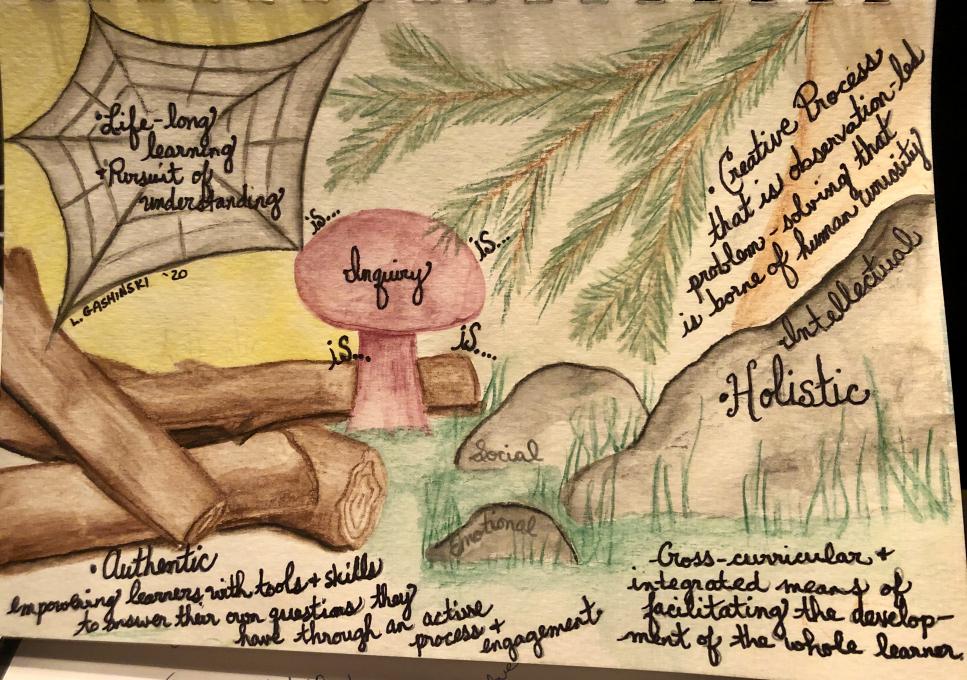
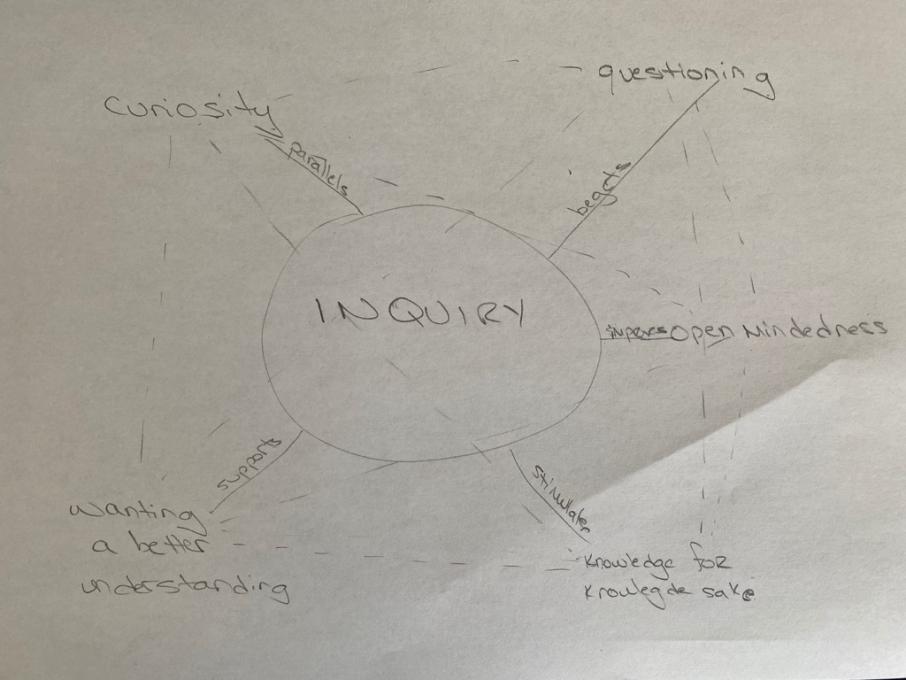
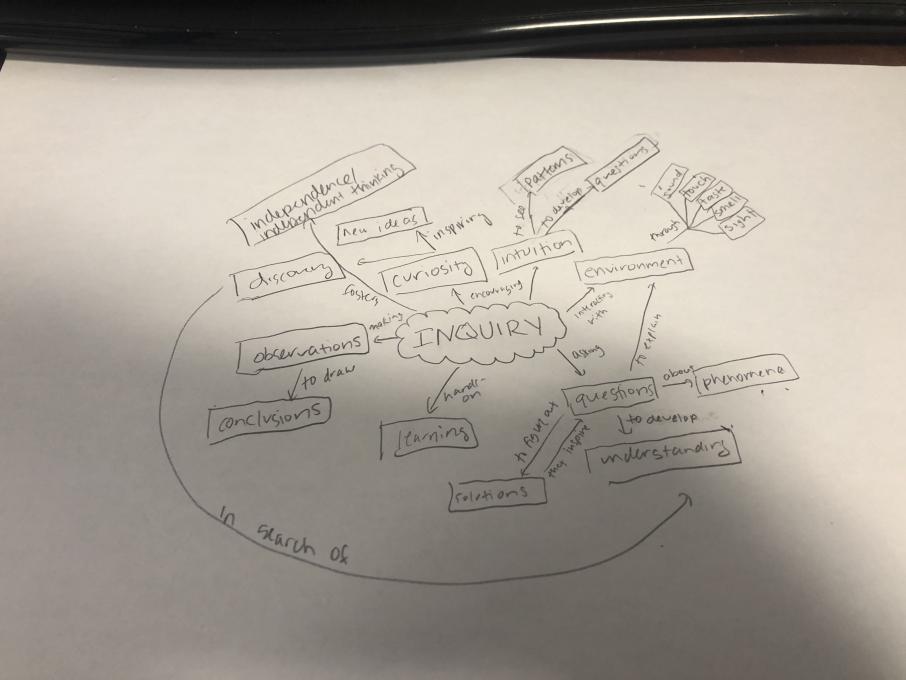
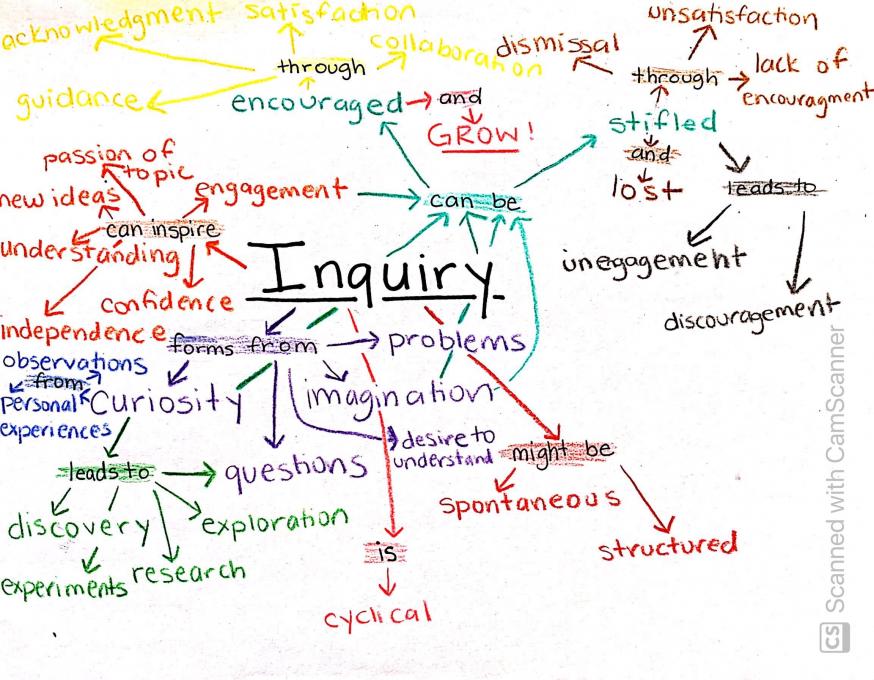
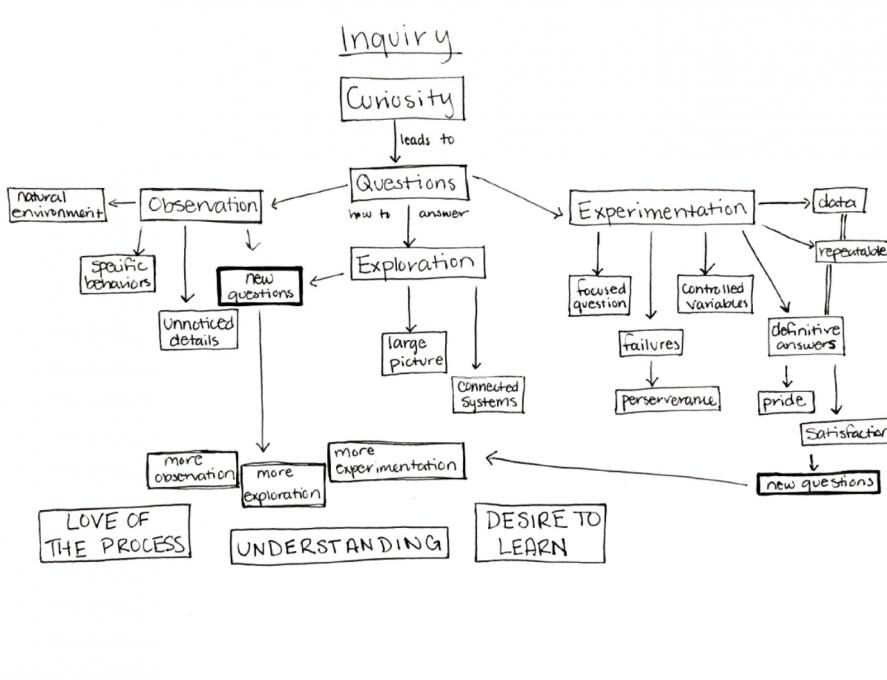
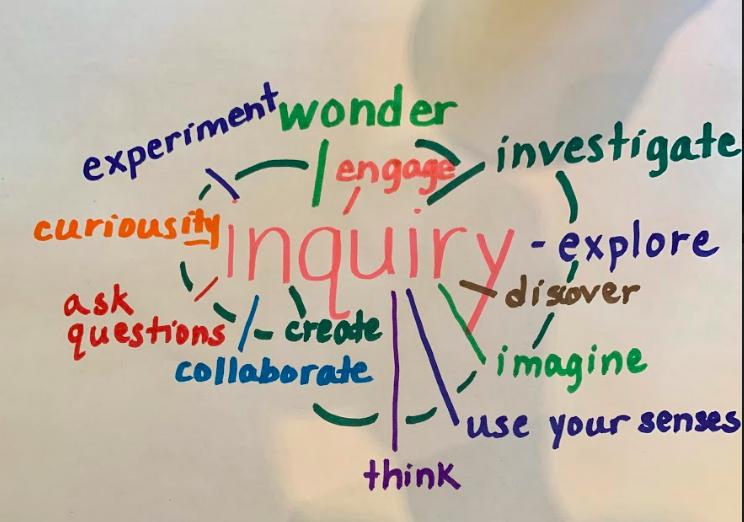
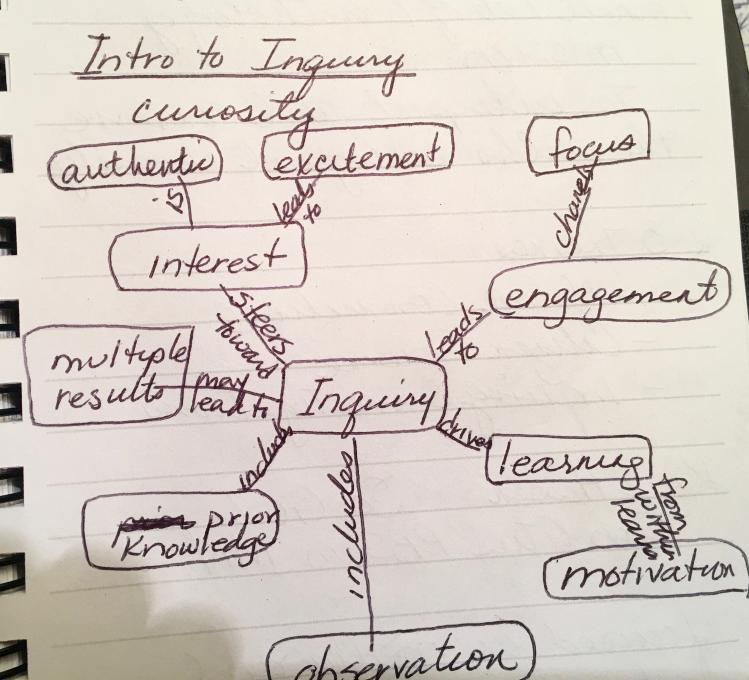
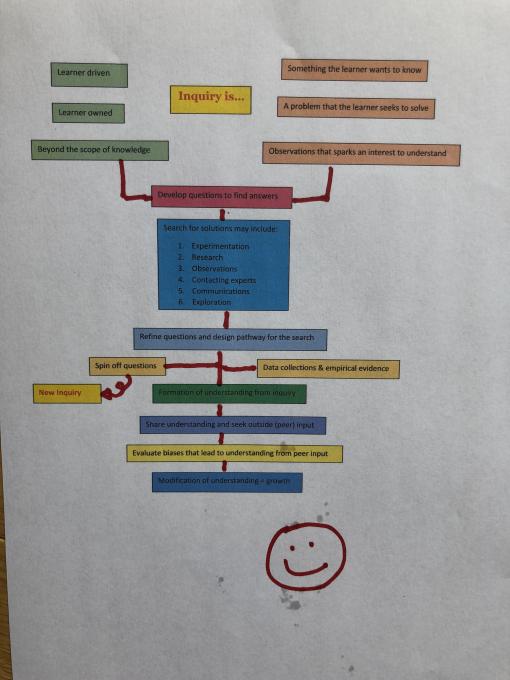
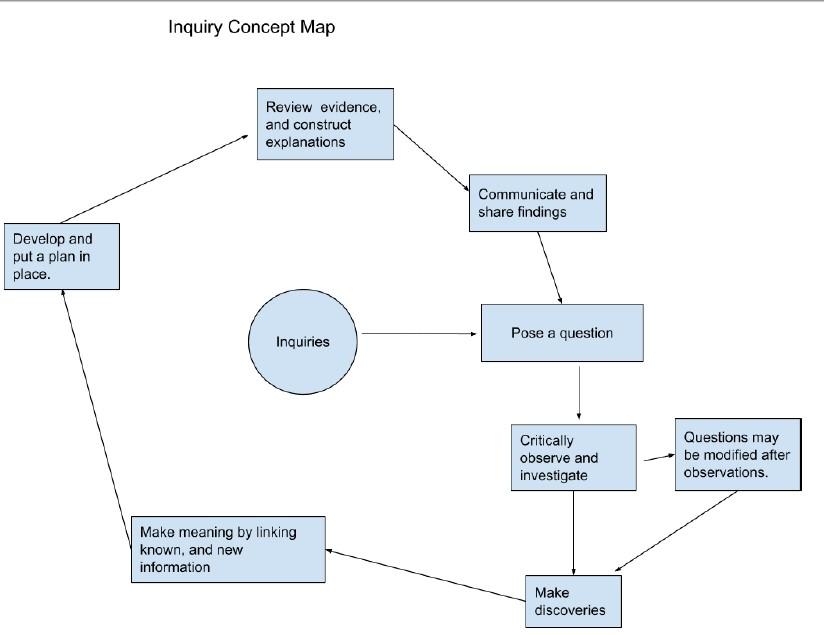 The process of making an inquiry starts with a question about something you want to investigate. After making observations or gathering data, the results may cause you to rethink your question or may allow you to continue to make discoveries through critical observation or data gathering. This process can also be affected by what you already know, and applying the knowledge, making sure you take into account the new discoveries. Once all the data has been collected, and reviewed, an assumption can be created. The findings can be shared and reviewed by others.
I really like the emphasis how critical thinking and life-long learning skills are developed when going through an inquiry.
The process of making an inquiry starts with a question about something you want to investigate. After making observations or gathering data, the results may cause you to rethink your question or may allow you to continue to make discoveries through critical observation or data gathering. This process can also be affected by what you already know, and applying the knowledge, making sure you take into account the new discoveries. Once all the data has been collected, and reviewed, an assumption can be created. The findings can be shared and reviewed by others.
I really like the emphasis how critical thinking and life-long learning skills are developed when going through an inquiry. 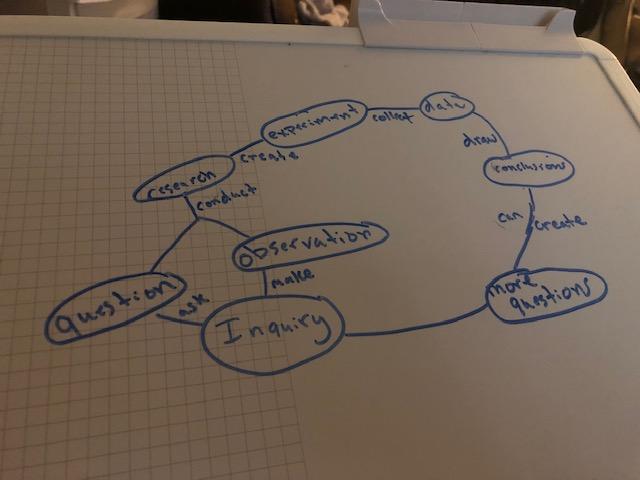
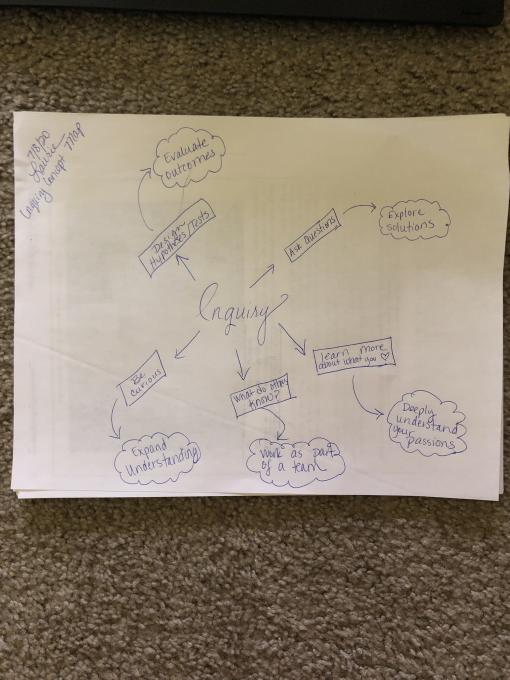
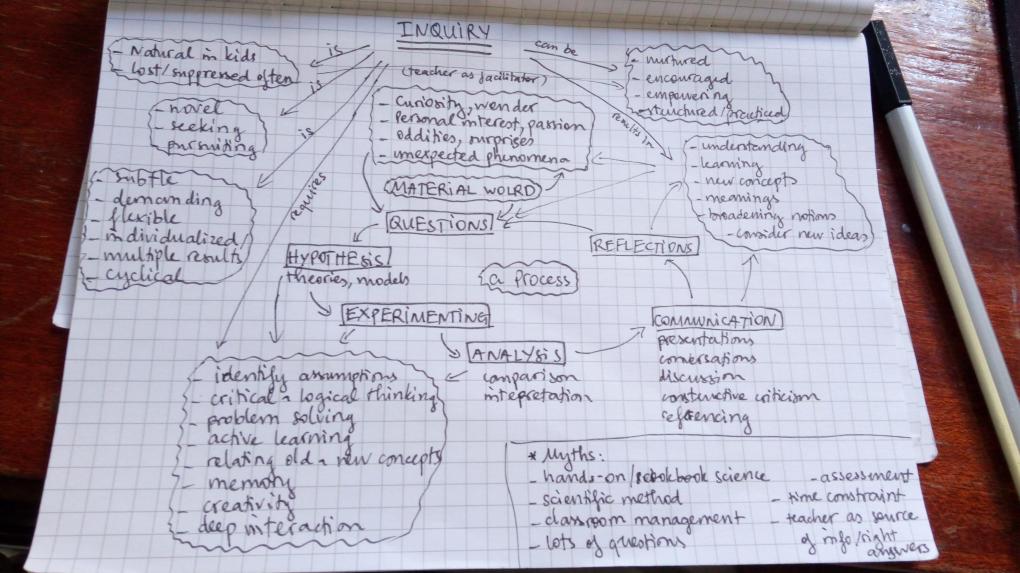 And this is the "Before (reading)" concept map, for comparison:
And this is the "Before (reading)" concept map, for comparison:
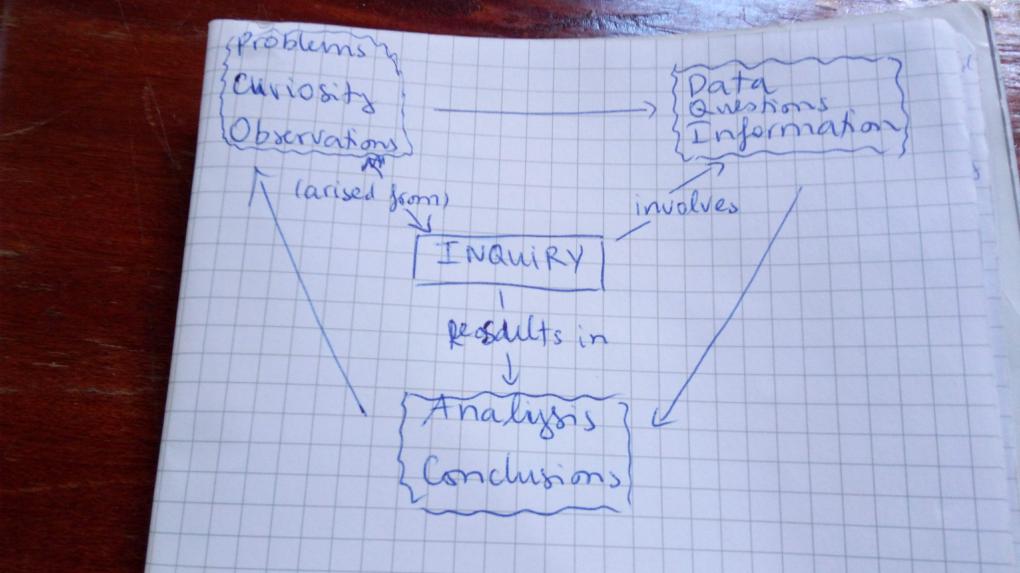
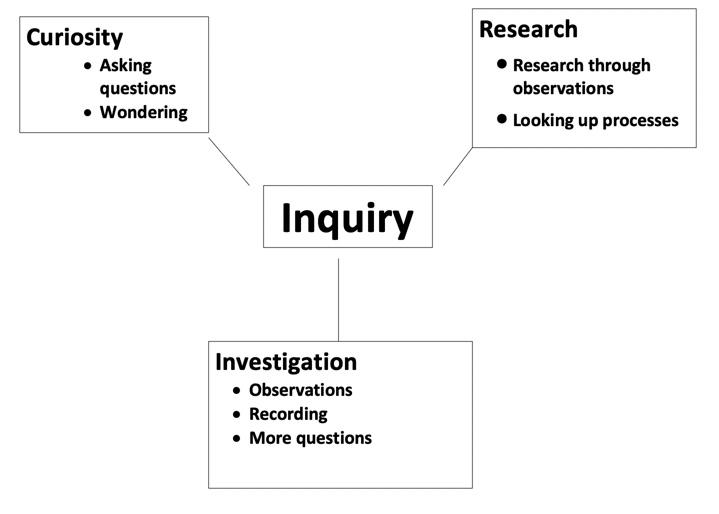 Inquiry is the way humans learn about their natural world. It is something humans naturally do but unless it is nurtured, we forget how to participate in the process. When we answer children's questions and do things for them we are stifling their ability to figure things out. We must nurture their curiosities and encourage them to try to find the answers to their questions through investigations.
Inquiry is the way humans learn about their natural world. It is something humans naturally do but unless it is nurtured, we forget how to participate in the process. When we answer children's questions and do things for them we are stifling their ability to figure things out. We must nurture their curiosities and encourage them to try to find the answers to their questions through investigations. 
